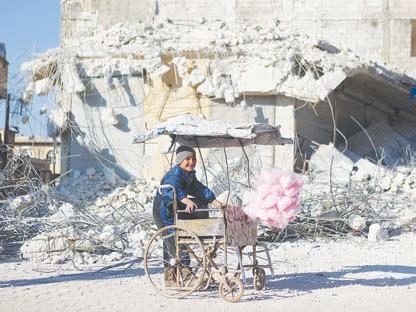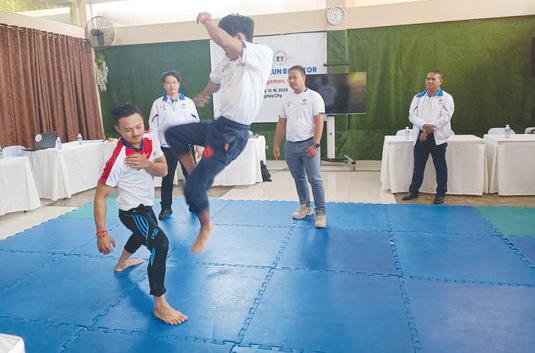
2 minute read
PBBM to push use of hybrid variety in rice production
By Vince Lopez
PRESIDENT Ferdinand Marcos Jr. has agreed to expand the use of hybrid rice as a better alternative to the inbred variety of rice to increase crop production.
At the same time, the President said he was optimistic that the Philippines
Quake death toll near 40k after 8 days could come close to self sufficiency in rice in two years if the government can carry out a major reorganization of several key agencies.
AN AID convoy passed through a newly reopened border crossing into rebel-held north Syria, where help has been slow to arrive since last week’s earthquake, which killed nearly 40,000 people in the region.
Rare survivors were pulled from the debris eight days after the 7.8-magnitude quake struck Syria and Turkey, but the focus has switched from rescue to providing food and shelter to millions in need.
A caravan of 11 United Nations trucks entered Syria through the reopened Bab al-Salama border point, after Damascus agreed to let the world body use the crossing for aid.
The Presidential Communications Office (PCO) on Wednesday said the President met Tuesday with SL Agritech Corporation (SLAC) chairman and chief executive officer (CEO) Henry Lim Bon Liong and various farmers from Central Luzon to address the challenges in the rice industry.
Marcos said he will implement a program to promote the shift to hybrid rice by providing subsidies and facilitating er Jullebee Ranada this month.
“Reforms should have been done last year, 10 years ago,” said Sen. Raffy Tulfo in reaction to an exclusive story by Manila Standard on Wednesday, which noted that at least two Filipinos per day experienced violence in the form of physical abuse, sexual harassment, or rape in Kuwait last year.


Gov’t to cut sugar prices by 85% with 440k MT of imported supply
By Othel Campos
THE Sugar Regulatory Administration has authorized the importation of 440,000 metric tons of refined sugar to bring down the price of the sweetener and manage local demand.
According to Pablo Luis Azocana, sugar board planters’ representative at the SRA, the government allowed for the importation of 200,000 MT of sugar classified for domestic use or “B” sugar and another 240,000 MT as buffer stock, classified as “C” or reserve sugar.
“We have an allocation for immediate arrival. This is expected to drive prices down to about 85 percent,” he said at the Laging Handa public brief- ing Wednesday. Azocana stressed that imported sugar will be priced accordingly so as not to hurt farmers, some of whom are opposing the move.
“It is our goal that farmers get a fair price for their produce so that they will continue farming,” he said, adding that the government refused to give in to proposals to import raw sugar instead of refined since the local harvest provides bountiful reserves of raw sugar.
Based on Sugar Order (SO) No. 6 series of 2022-2023, the country’s second sugar import program aims to maintain a balanced supply and demand of sugar for domestic consumption while ensuring
THE Philippine Health Insurance Corp. (PhilHealth) will increase its coverage for outpatient hemodialysis from 90 sessions to 156 sessions this year.
In a media forum on Wednesday, PhilHealth President and Chief Executive Officer Emmanuel Ledesma Jr. said this is part of their commitment to implement enhancements in the benefit packages for 2023.

“This increase in the number of sessions covered is based on standards for adequate dialysis which requires three four-hour sessions every week for chronic kidney disease Stage 5 patients,” Ledesma said.




